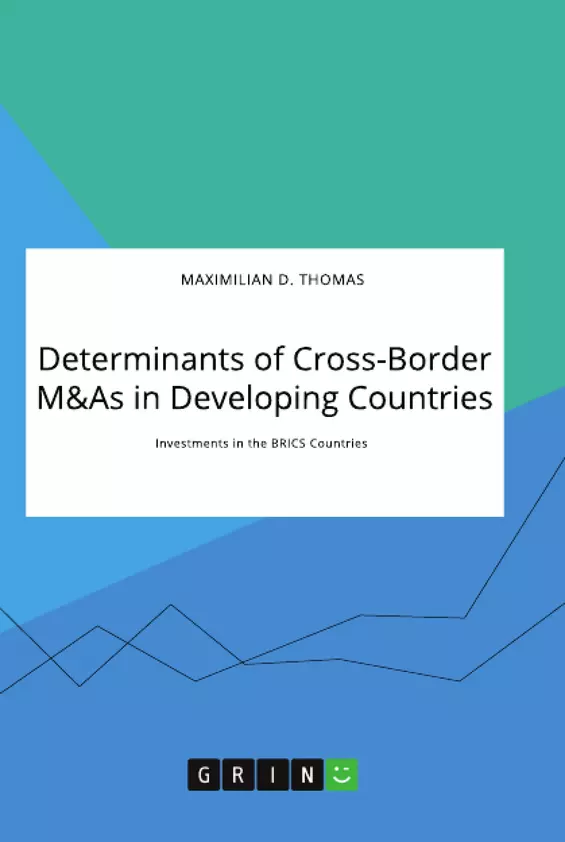The aim of this thesis is to identify country-specific factors that represent determinants for merger and acquisitions. On the one hand, findings on country-specific determinants might be helpful to explain why some countries (e.g. China) receive more cross-border M&As than others (e.g. India). On the other hand, the results reveal which interests transnational companies pursue and how they change. Drawing on this evidence, policy makers and companies may be able to influence the determining factors in order to stimulate or impede inbound investments in form of M&As.
During the last three decades, the importance of cross-border mergers and acquisitions (M&As) as a favourite top-level managerial strategy of multinational enterprises (MNEs) and national champions has increased significantly. The global value of cross-border M&As has grown from around USD 100 billion in 1990 to USD 815 billion in 2018, peaking in 2007 with over USD 1 trillion just before the outbreak of the global financial crisis.
This development is not surprising, since the ongoing globalization and the changing global market landscape lead to more complex challenges for companies. In order to face the increasing intensity of competition that accompanies the global integration of markets, cross-border M&As constitute an appropriate way of maintaining competitiveness and creating added value. The acquisition of pre-existing foreign assets enables MNEs not only to exploit synergies and growth opportunities but also to overcome latecomer disadvantages. In addition, M&As offer a time advantage over organic growth strategies such as greenfield investments, which is particularly important considering the dynamic market conditions and the shortening product life cycles.
This thesis examines the research question of which country-specific factors determine the volume of inbound cross-border M&As in developing economies. In general, the choice of a cross-border acquisition as an entry mode into a foreign market is influenced by three types of factors: (1) firm-specific factors such as prior acquisition experience, product diversity and core competences; (2) industry-specific factors such as technological, sales and marketing intensity; and (3) country-specific factors such as market size and institutional quality. While firm- and industry-specific factors also play a role in domestic M&As, country-specific factors are a peculiarity in cross-border M&As.
Inhaltsverzeichnis (Table of Contents)
- Introduction
- Importance of inbound cross-border M&As
- Definitions and classifications
- Theory-based explanation of cross-border M&As
- Global trend and consequences of cross-border M&As
- Analysis of country-specific determinants of inbound cross-border M&As
- Macroeconomic environment
- Economic development
- Tax incentives
- Labour compensation
- Political and institutional environment
- Governance quality and corruption
- Accounting standards
- Financial market environment
- Level of human capital
- Target country's openness
- Macroeconomic environment
- Econometric analysis
- Data description and preparation
- Dependent variable
- Independent variables
- Research model
- Descriptive statistics
- Results
- Baseline results
- Robustness test and additional analysis
- Data description and preparation
Zielsetzung und Themenschwerpunkte (Objectives and Key Themes)
This master's thesis aims to empirically analyze the determinants of inbound cross-border mergers and acquisitions (M&As) in developing economies, specifically focusing on investments in the BRICS countries (Brazil, Russia, India, China, and South Africa). The study seeks to identify the key factors influencing foreign companies' decisions to acquire businesses in these emerging markets.
- Macroeconomic environment as a determinant of inbound cross-border M&As
- Political and institutional environment and its impact on cross-border M&As
- Role of financial market environment and human capital in cross-border M&As
- Importance of target country's openness in attracting foreign investment
- Econometric analysis of the relationship between country-specific factors and M&A volume
Zusammenfassung der Kapitel (Chapter Summaries)
- The introduction provides a brief overview of the research topic and its significance in the context of global business and economic development.
- Chapter 2 focuses on defining and classifying inbound cross-border M&As, exploring theoretical explanations for their occurrence, and analyzing the global trend and consequences of such transactions.
- Chapter 3 examines country-specific factors that influence inbound cross-border M&As, including macroeconomic factors like economic development, tax incentives, and labor compensation, as well as political and institutional factors such as governance quality, corruption, and accounting standards. It also explores the roles of the financial market environment, human capital, and target country's openness.
- Chapter 4 delves into the econometric analysis of the relationship between country-specific determinants and the volume of inbound cross-border M&As. It describes the data preparation, research model, and statistical results obtained from the analysis.
Schlüsselwörter (Keywords)
This master's thesis focuses on key concepts such as inbound cross-border M&As, developing economies, BRICS countries, macroeconomic factors, political and institutional environment, financial market environment, human capital, target country's openness, econometric analysis, and statistical modeling.
Frequently Asked Questions about Cross-Border M&As in BRICS
What are the primary determinants for inbound M&As in developing countries?
Key determinants include market size, macroeconomic stability, institutional quality, labor costs, and the target country's openness to trade.
Why do companies choose M&As over greenfield investments?
M&As offer a significant time advantage for market entry, allow for the exploitation of existing synergies, and help overcome latecomer disadvantages.
Which countries are included in the BRICS group?
The BRICS countries are Brazil, Russia, India, China, and South Africa.
How does political corruption impact foreign investment decisions?
Poor governance and high corruption levels generally act as a deterrent, increasing the risks and costs for transnational companies.
What role does human capital play in attracting M&As?
A high level of human capital indicates a skilled workforce, which is essential for companies looking to acquire technologically advanced or service-oriented assets.
- Quote paper
- Maximilian D. Thomas (Author), 2020, Determinants of Cross-Border M&As in Developing Countries. Investments in the BRICS Countries, Munich, GRIN Verlag, https://www.grin.com/document/914772



